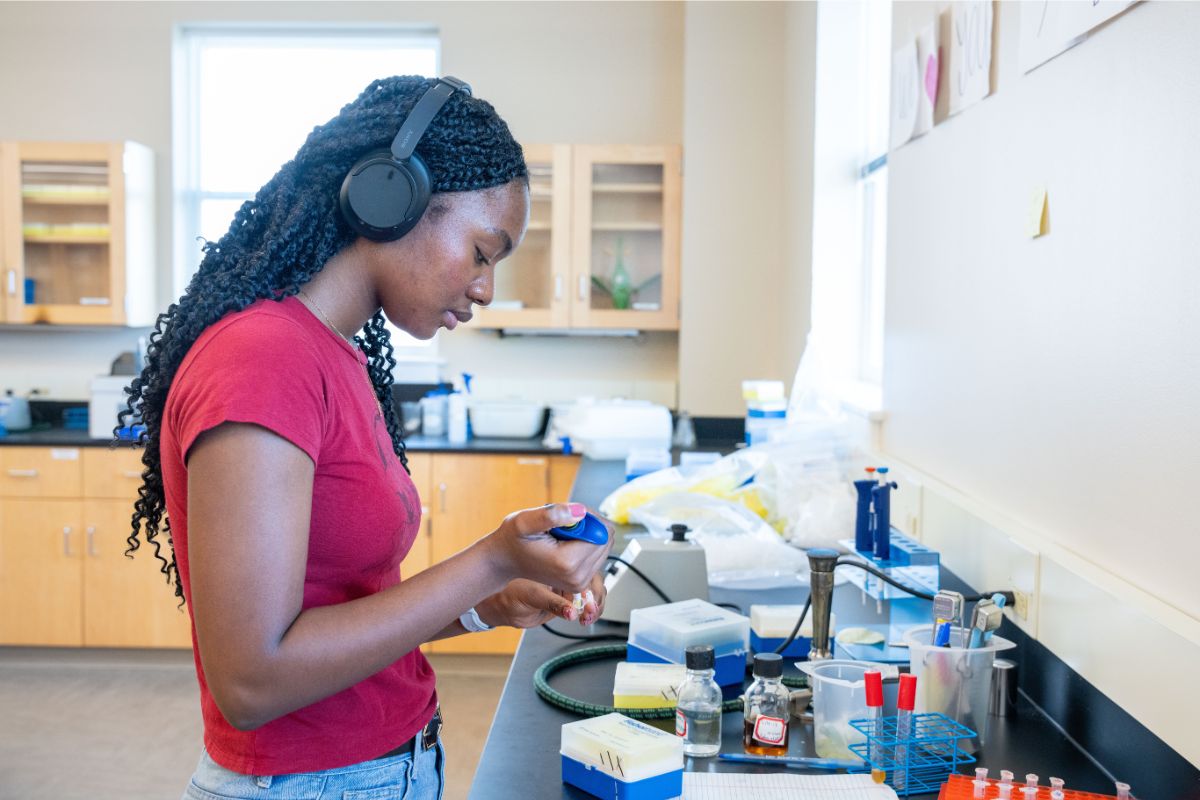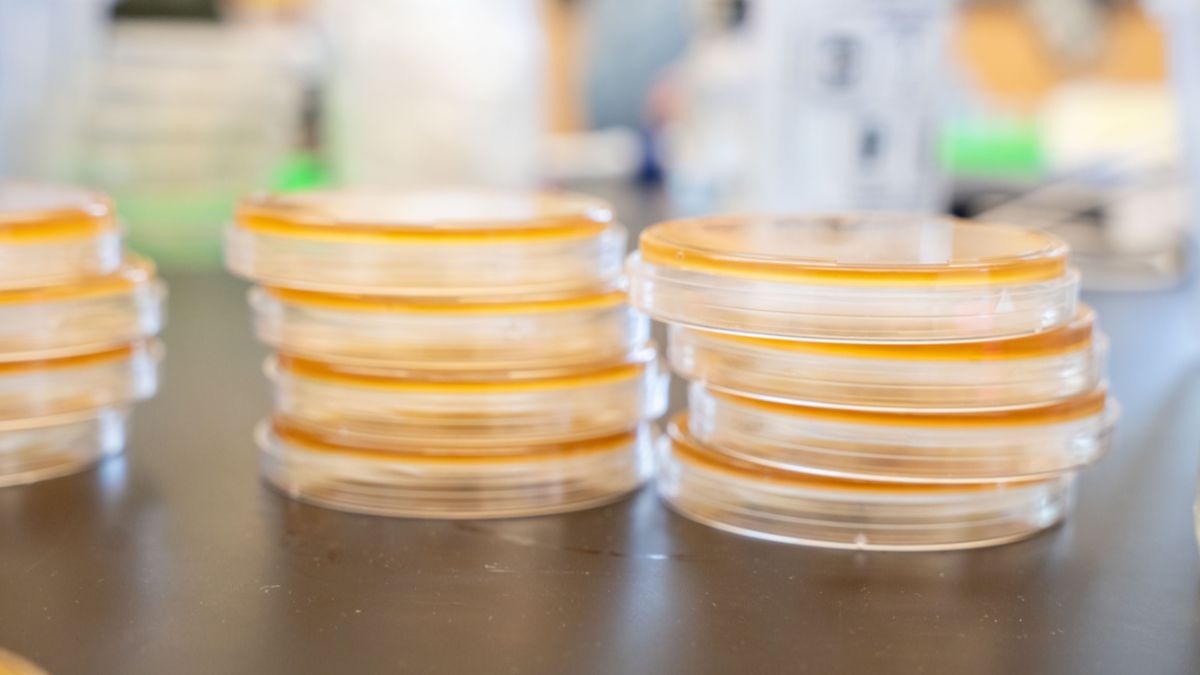Symone Hodges, Cosette Sullenberger, Angela Nwozo and Izzy Valdivia get hands-on with CRISPR as undergraduates
This summer, approximately 50 students from the College of Sciences and Mathematics are spearheading their own undergraduate research projects on campus as part of the College’s Summer Undergraduate Research Fellowship in the Sciences (SURFS).
Research groups span from neuroscience to environmental science to mathematics, each led by a faculty advisor providing advice and expertise.
As SURFS 2025 concludes, four biology students are wrapping up their research projects utilizing a tool revolutionizing modern medicine and the health care industry: Clustered Regularly Interspaced Short Palindromic Repeats (CRISPR) — a revolutionary gene-editing technology that research scientists use to selectively modify the DNA of living organisms.
In 2023, the FDA approved the first gene therapies to patients with sickle cell disease, and the methodologies proposed use CRISPR-based therapies. In addition to health care, CRISPR is being used at the forefront agriculture, biotechnology and other industries to pave the way for scientific innovation.
Undergraduate lab access to CRISPR is not offered by many universities, but sophomore Cosette Sullenberger and juniors Izzy Valdivia, Symone Hodges and Angela Nwozo are utilizing CRISPR in research that interests them on an individual level at Belmont this summer.

Izzy Valdivia
Research That Matters
All four students are working with CRISPR-Cas9, a gene editing system originally discovered by scientists when studying the adaptive immunity of bacteria, according to Hodges.
"Whenever there's a virus that tries to infect the cell, the cell will use CRISPR to basically memorize the virus's genome and then attack it when it comes back," she said.
Hodges’ research focuses on the cas9 enzyme and guide RNA molecules. She is studying how these components work together to locate and cut specific DNA sequences.
Sullenberger is using CRISPR-Cas9 in yeast to repair genetic mutations, fixing cellular defects at the DNA level.
Valdivia is working with bacteriophages, or viruses that infect bacteria. In her experiments, a CRISPR system found in a bacterial species is introduced to E. coli to see if the bacteria develops immunity against the viral attack.
Similarly, Nwozo is studying how different bacterial strains of S. thermophilus, commonly found in lactose, respond to bacteriophage infections. She examines strains that have already survived exposure and acquired protective genetic spacers through CRISPR.
At most universities, only graduate students or PhD students conduct research of this caliber.
"I think it's pretty cool that SURFS is really catered toward the underclassman,” said Nwozo. “When I got to Belmont, SURFS was pushed heavily to freshmen, and then they accepted a ton of freshmen and sophomores. Giving younger students the opportunity to research is really great.”

Angela Nwozo
Learning Through Trial and Error
As any researcher knows, obstacles are the name of the game when experimenting. All four students encountered initial setbacks and learning curves that yielded fulfilling results and personal satisfaction down the line.
"The first time I did plaque assays, it was awful," recalled Nwozo. "I couldn't even finish — I left early that day because I messed it up completely. But eventually, one Saturday when I wasn’t even in the lab, [our group leader] Dr. Becky Adams sent me a picture and an audio message saying, 'Oh my gosh, you finally got it! I'm so happy, you’re doing great.’ That was the most rewarding moment for me.”
Valdivia recalled a similar experience.
"The first time I did plaque assays, I completely forgot to even add the virus to the bacteria and just put bacteria on plates,” she laughed. “Getting that right after five times and not having any contamination — that was fantastic."
For Sullenberger, success was earned after diagnosing an issue her group combated for multiple weeks.
"We realized our protocol was bad, so our yeast died every week,” she explained. “Then we came in one Monday, and they were alive. It’s amazing to think you can do something with your hands that changes the gene of another thing.”

Cosette Sullenberger (right)
Faculty Support Every Step of the Way
One thing that sets Belmont's research experience apart, according to students, is the level of faculty mentorship and support available to undergraduates.
"At first, I was afraid we would just be thrown out there with no experience and not know what to do,'" said Valdivia. "But we have a lot of guidance on how to create protocols and what to do when something doesn't work out. You have your mentors, and they're here to help you prepare for whatever might be next."
Hodges was drawn to Belmont specifically for its research opportunities and faculty guidance. During an initial campus tour, CSM Dean Dr. Thom Spence emphasized how undergraduates get hands-on research experience immediately rather than waiting for graduate school, and how dedicated its faculty are to providing that experience to students.
“He was just hitting on so many things I felt like I was not hearing from other schools about how important it was to actually research during the early stages of learning,” she said. “He talked about a professor here, Dr. Adams, doing stuff regarding mRNA export and that’s something I had been interested in since high school, but could never really explore. As soon as I heard that, I knew this was the place I wanted to be.”
At Belmont, I could actually be in a lab with people that are answering questions I've had since I first discovered my love for the sciences.

Symone Hodges
For Future Scientists
For prospective students looking to research at Belmont, this group has a clear message — do not let lab inexperience hold you back.
"Don't be afraid of not knowing things," advised Sullenberger. "This is our first exposure to being in this setting. That's what science usually is — not knowing things and having to find them out."
Valdivia agreed, echoing action over overthinking.
"Don't be afraid to just apply,” she encouraged. “The opportunity is there for a reason, and they really do want underclassmen to get an early experience. It's normal to feel underprepared, but just go for it."
Learn More
Learn more about summer research at Belmont.


